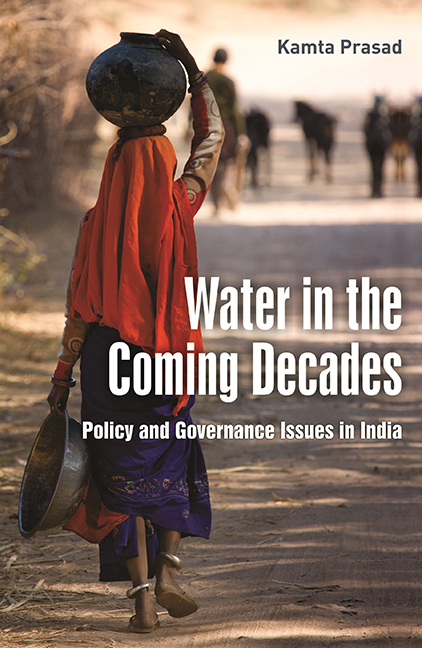Book contents
- Frontmatter
- Dedication
- Contents
- List of Tables
- List of Abbreviations
- Preface
- Acknowledgements
- Section I Overall Perspectives
- Section II Situational Analysis
- Section III Socio-economic, Institutional and Environmental Aspects
- Section IV Technological Options
- Section V Concluding Observations
- References
- Index
5 - Institutional Set-up and Development of Irrigation
Published online by Cambridge University Press: 13 July 2022
- Frontmatter
- Dedication
- Contents
- List of Tables
- List of Abbreviations
- Preface
- Acknowledgements
- Section I Overall Perspectives
- Section II Situational Analysis
- Section III Socio-economic, Institutional and Environmental Aspects
- Section IV Technological Options
- Section V Concluding Observations
- References
- Index
Summary
This chapter provides a brief review of irrigation which has been the most important component for the development of water resources in India, accounting for a bulk of public outlay on this sector in the country. After examining the institutional framework for the management and development of irrigation, the chapter throws light on the growth of surface irrigation with a focus on two important programmes of command area development and accelerated irrigation benefits. This is followed by an analysis of the growth of groundwater irrigation and its impact. The last section provides a comparative analysis of strengths and weaknesses of major, medium and minor irrigation projects along with their policy implications.
Institutional framework for the management of irrigation
During the early part of the British regime in India, irrigation development was under the control of the Central Government. It became a provincial subject under the Government of India Act, 1919. The responsibility of the Government of India was restricted to advice, coordination and settlement of disputes on the water of inter-provincial rivers. The same system continued under the Government of India Act, 1935, as well as under the new Constitution adopted after Independence.
The beginning of the Government of India's administrative structure for water resources may be traced back to the year 1854–55, when a newly created Department of Public Works was established with irrigation (mostly canals) coming under its purview. In due course, an Inspector General of Canal Irrigation was appointed to oversee irrigation-related matters. He, however, functioned under the administrative control of the Secretary, Public Works Department. From 1923 to 1952, irrigation used to be placed under different departments at the Centre. It was only in August 1952 that a separate Ministry of Irrigation and Power was set up to look after the subject of irrigation as well as power. This continued till early seventies when a separate Ministry of Irrigation was set up. For a brief time during the mid-seventies, the Department of Irrigation formed part of the re-constituted Ministry of Agriculture and Irrigation. Thereafter, the department of irrigation formed part of different ministries till September 1985, when it was renamed as the Ministry of Water Resources. This nomenclature and status as a separate ministry has continued since then.
- Type
- Chapter
- Information
- Publisher: Foundation BooksPrint publication year: 2014



